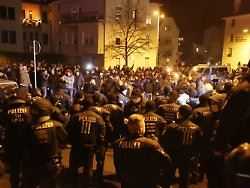Monday, December 13, 2021
Weekend riots
Radicalization of the corona demos are a cause for concern
In several places, some radical opponents of the corona measures take to the streets at the weekend. Often times it remains peaceful, but violence and other crimes also occur. Politicians from almost all parties are alarmed.
In politics, there is growing concern about the radicalization of opponents of government measures to combat corona. There were registered but also not approved demonstrations in numerous German cities at the weekend. In some cases there were riots. According to the police, 14 officers were injured in Greiz in Thuringia, and police officers and journalists were assaulted in Bennewitz near Leipzig. Violent excesses were also reported from Reutlingen in Baden-Württemberg and Gotha in Thuringia.
The North Rhine-Westphalian Interior Minister Herbert Reul expressed concern about the extremist part of the protesters. “They are extremely dangerous because they meanwhile not only talk, gossip, incite one another, but also take action,” said the CDU politician in the TV program of the “Bild” newspaper. Right-wing extremists would increasingly abuse the protests for their own purposes. There are increasingly “anti-democratic tones, unconstitutional tones”. That worries him very much. Therefore, he can only advise all Democrats “that we say together: It’s over, there is a limit here.”
Thuringia’s Interior Minister Georg Maier also warned: “We as a society have to find a very clear language.” A small minority is becoming “louder and louder, more and more radical,” said the SPD politician. Right-wing extremists took advantage of this. The minister criticized calls to publish the addresses of politicians as “perfidious and unbearable”, “so that they no longer have a good life”.
Wiese: “Organized attempt to split up”
Terrorism expert Peter Neumann also did not rule out terrorist dangers from these protests. “What we have already seen in isolated cases are more complex attacks on the RKI, for example, or on clinics and vaccination centers.” He could therefore imagine “that in a few months we may actually have to speak of a terrorist campaign,” said Neumann.
Bundestag President Bärbel Bas also noted a “noticeable” radicalization in the protests. “This is definitely a threat to our democracy,” said the SPD politician on the ZDF program “Berlin direkt”. She called for a ban on demonstrations in front of the private houses of politicians and closer observation of Telegram chat groups. Many critics of Corona measures network via the messenger service.
SPD parliamentary group vice-president Dirk Wiese spoke of a “progressive radicalization of a small minority”. This must be met with “absolute attention from the security authorities”, he told the “world”. Wiese warned: “We are experiencing an organized attempt to divide and rush.”
Schwesig: “Don’t leave the streets to radicals”
Green parliamentary deputy Konstantin von Notz considers the increasing radicalization of the protests to be “more than frightening”. For too long, Reich citizens and so-called lateral thinkers had been dismissed as harmless, but one had to “position oneself resolutely as a democracy,” demanded von Notz in the “Welt”. FDP parliamentary group deputy Konstantin Kuhle warned: “Every individual has a responsibility to stay away from militant groups.” Union parliamentary group vice-chairman Thorsten Frei underlined: “In this situation, the state must by no means appear weak.”
Mecklenburg-Western Pomerania’s Prime Minister Manuela Schwesig called for “not to let the radicals take the road”. “Many have very different goals than Corona, they use the emotional debate about the compulsory vaccination to divide,” said the SPD politician of the “Bild” newspaper. Democratic decisions must be accepted by everyone. “Here our democracy has to build a firewall against violence. Our society and the state have to stand up to the splitters and corona agitators. Because in the end they threaten not only politicians, but all of us.”
